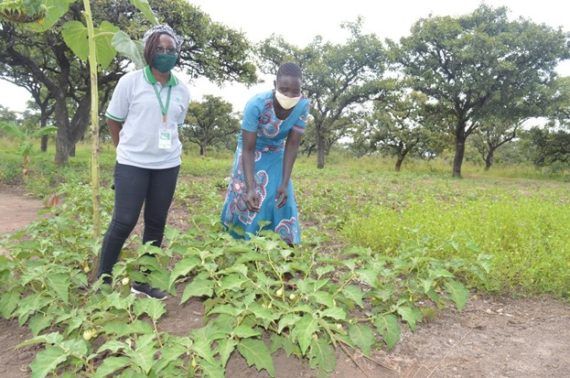 Stories
Stories
February 11, 2022 • 3 min read
Six months ago, Juliet Adokorach, a 25-year-old mother of five, faced many challenges due to regular outbreaks of diarrheal diseases within her family.
In her village of Yotkom in Agago district, northern Uganda, open defecation is still practiced by many residents due to a lack of toilets and latrines. Juliet and her husband John, 28, regularly visited the health facility in the nearby town of Pacer, to treat their children for diarrhea. This took a toll on the family’s income as they often had to buy medicine and take time off work to care for their children.
Seeing the family’s plight, Juliet and John were invited to join GOAL’s Nutrition Impact Positive Practice (NIPP) program. As part of NIPP, the couple received three-part training in social behavior change, improved cooking techniques and micro-gardening. The ultimate aim of the project is to improve hygiene and nutrition standards in the home.
Juliet and John are receiving support through the One Nutrition in Complex Environment (ONCE) project, part of USAID’s Feed the Future program in Uganda’s Agago district.
Working as a couple to change their situation
Juliet was very enthusiastic when she heard about the program. Her husband needed more convincing.
“He was very hesitant at the beginning, but agreed to come. I was motivated to join because the sessions also involve men in the community, whose decisions are crucial in changing the wellbeing of a family,” Juliet says.
Together, Juliet and John joined local group circle sessions where a GOAL-trained and supported local volunteer discussed the need for proper sanitation. Participants are encouraged to construct a pit latrine (toilet), install handwashing facilities and and refuse pits. Parents taking part are also shown how to prepare nutritious meals using locally made fuel-efficient stoves.
Prior to the training, Juliet and her family were using a neighbor’s pit latrine which was on the verge of collapse.
“We often thought of constructing a pit latrine,” says Juliet, “but it seemed too expensive and we never saw it as a priority. After the training, we realized how important it is started construction on our own latrine. I also installed a handwashing facility” (a tippy tap).
“This led to us being sick less and has helped us to save money. We now have the money to buy other essentials like sugar, soap, and salt.”

Juliet showing GOAL Nutrition Officer, Gloria Anena, her micro-garden.
Establishing a micro-garden to supplement on diet
The circle sessions also promote the production of nutritious food at home. Inspired by this, the couple also began improving home nutrition standards by setting up their own micro-garden where they grow green vegetables such as egg plant and Malakwang – a local bittersweet delicacy.
Juliet is among the 15 women in her community who now run a successful micro-garden. The gardens are helping to improve families’ diets, reducing cases of malnutrition and tackling food insecurity.
The program has transformed the family’s fortunes. Juliet’s one-year-old son, Ongom, is benefitting from the knowledge she gained on the program. Every morning he starts the day with a healthy bowl of homemade porridge that Juliet learned how to cook from the group’s cooking demonstrations.
Juliet is full of praise for the NIPP approach. It has also helped her marriage.
“Ever since we started attending the circle sessions together, we now communicate more often. He listens more and pays attention to our needs more than before. I want to thank GOAL for having included our spouses in this program – it has made them take ownership of the family’s needs.”
